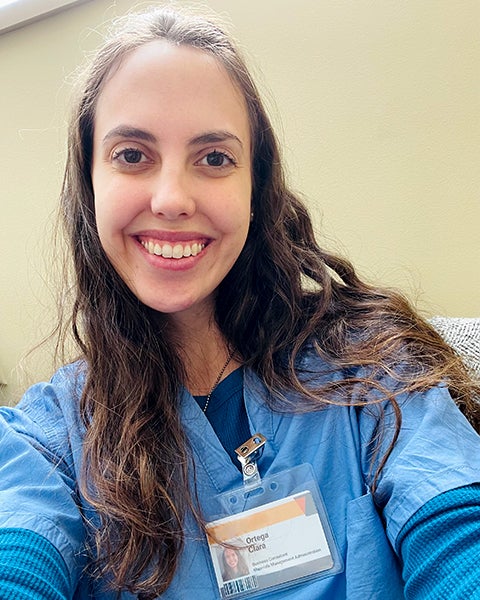Improving Population Health Through Hospital Administration
(November 22, 2022) — Clara Ortega (NHS’21) says she has always been driven to find ways to improve health outcomes. Once she realized that decisions made in health care administration could greatly impact population health, she knew she wanted to be part of that decision-making process.
“In my [health care management and policy] courses, there was a huge emphasis on how hospitals were becoming more accountable for population health through an evolving reimbursement structure no longer based on a fee-for-service but instead on effectiveness of care,” said Ortega. “This value-based care model based on outcomes instead of volume really resonated with me.”
“Clara recognizes the complexity of health care,” said Christopher King, PhD, MHSc, FACHE, dean of the School of Health. “She is mission-driven and has consistently demonstrated her skills in operationalizing services and evaluating outcomes to achieve quality care at the lowest cost.”
Seeing Health Care Through an International Lens
Ortega grew up in Sao Paulo, Brazil, and moved to the United States to attend Georgetown. Ortega’s familiarity with Brazil would later inspire her undergraduate thesis work.
“I wanted to come to the United States to study because of the flexibility in the American education system,” Ortega said. She switched majors three times before settling into her major — health care management and policy.

“I found my passion in health care management,” said Ortega. She remembers a lecture in one of her global health classes, one of her previous majors, where the professor mentioned that a lot of global health efforts fail because of a lack of effective administration. “That made me think and want to know more about administration,” she said.
The health care administration theory of “lean health care” — finding and implementing more efficient systems within a clinic setting in order to better health outcomes — framed Ortega’s approach to health care administration. She explored the theory further in her undergraduate honors thesis — a qualitative analysis of a public-private partnership between Brazil’s Ministry of Health and Hospital Sírio-Libanês aimed at reducing overcrowding in emergency rooms.
“Health care is a right in Brazil, so access is very important,” said Ortega. “If a person needs care and has to wait days or weeks, this compromises the health care of the country.”
Ortega analyzed survey results from interviews with 77 hospital administrators who were trained in lean health care methods, including reducing waste, bureaucracy and unnecessary processes. She found that almost 90% of respondents agreed their hospitals were better equipped to handle overcrowding and workflow management after applying lean health care principles.
“It was really impressive that she collaborated with Brazilian health authorities to interview 77 hospital administrators,” said Sean S. Huang, PhD, associate professor of health management and policy who also served as Ortega’s thesis advisor. “From early on, she demonstrated a strong passion toward quality of care and quality improvement.”
“My thesis further demonstrated to me the impactful work that effective administration can have on people’s health, and solidified that this is the type of work I wanted to do moving forward,” Ortega said.
Applying Theory to Practice
After graduating in 2021, Ortega worked full-time as a health care consultant with Guidehouse, a leading provider of management, technology and risk consulting services headquartered in Chicago. She was involved with one project focused on improving supply chain issues for a hospital in Virginia.
“Employees within the hospital were purchasing supplies from various organizations instead of using the contracts the hospital had put into place with a specific vendor to secure bulk discounting,” Ortega said. “You can see how it’s wasteful to have the same needle purchased from 20 different vendors. But the additional unnecessary supplies also led to organizing and cluttering problems within supply closets, which can lead to inefficiencies and ultimately impact care.”

Ortega’s experience with Guidehouse showed her the full range of skills a person must have in order to be an effective hospital administrator. “Yes, you deal with those nitty gritty details in hospital administration, like organizing a supply closet, but there’s the other side, where you have to be able to think systematically about finances, strategy and operations.”
Working at Guidehouse showed Ortega how health care consultants apply knowledge they accrued from the “outside” based on their previous work with other hospitals. But Ortega is excited to start the next chapter in her health care administration journey “inside” the hospital — as an administrative fellow at Cleveland Clinic. Her administrative fellowship will also fulfill a yearlong experiential component to her Master of Health Administration program at Johns Hopkins University.
“I really wanted to get the experience of working on the provider side in a hospital setting,” she said. “The expertise consultants provide is what worked in several other hospitals with the same issue. This is different from the perspective of someone who knows the providers and may have insight as to what is currently working well within the hospital.”
Ortega will work on 20 to 25 projects over the course of a year with the Cleveland Clinic, where she hopes to apply the skills she learned as a consultant “internally” by researching the problem the hospital is having and finding suggestions to fix the problem. “The Cleveland Clinic is known for its excellence in patient care, so they have a strategy that works well, and I’m looking forward to learning from them, both the administrators and providers,” she said.
Ortega credited Georgetown, especially the School of Nursing & Health Studies, for helping her find her passion for hospital administration. “I had so many great mentors who set me up for success, especially [Dean] King, who was my recommender for the Cleveland Clinic and my graduate program at Johns Hopkins,” she said. “Georgetown led me to where I am.”
Heather Wilpone-Welborn
GUMC Communications
Topmost Image: Clara Ortega (NHS’21) is starting an administrative fellowship with the Cleveland Clinic. She credits Georgetown with helping her find her passion for hospital administration.

